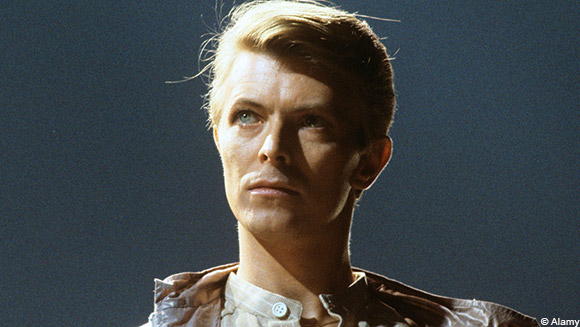David Bowie 1947-2016: A record-breaking look back at the music icon’s incredible life

David Bowie, one of the most innovative and influential musicians of his era, has died at the age of 69 from cancer.
From kick-starting the glam rock explosion in the early 1970’s, to being a pioneer of the music video, his chameleon-like ability to reinvent himself made him a pop music icon for more than four decades.
Having broken so much new ground in the world of music, film, fashion and even technology, David Bowie was unsurprisingly no stranger to the pages of the Guinness World Records book, featuring several times over the course of his career.
Born and raised in South London, he released his first studio album in 1969, having changed his name from David Jones the year before.
His breakthrough hit ‘Space Oddity’, a song telling the story of a doomed astronaut, gave an early glimpse of his knack for impeccable timing, with its release coming just days before the 1969 moon landing.
Following 1971's 'Hunky Dory' album, which featured stand out hits ‘Life on Mars’ and ‘Changes’, Bowie undertook a radical reinvention.
Signposting his trademark trait for metamorphosis, in 1972 the singer adopted the persona of a flamboyant, fictional rock star who acted as a messenger for extraterrestrial beings with the release of 'The Rise and Fall of Ziggy Stardust and the Spiders From Mars'.
The concept album would deliver some of his most famous songs such as ‘Starman’ and ‘Suffragette City’, and in turn bring him worldwide stardom.
Despite the success of his alter ego, and much to the shock of his fans, Bowie would kill off Ziggy Stardust just a year later.
His shape-shifting career would see him adopt several other guises, from the Thin White Duke to later incarnations as a soulful rocker and an electronic music innovator, and in turn see him rack up hit after hit, from ''Rebel, Rebel', to 'Heroes', to ‘Ashes to Ashes’, and 'Let's Dance'.
Such memorable tracks helped him eventually set a record for the most UK No.1 albums by a British male singer, having reached the top of the charts on nine occasions – a benchmark only relatively recently surpassed by Robbie Williams.
A huge draw on the live stage, Bowie made the pages of the 1991 edition of the Guinness World Records book under the Most successful singers category, noting how he had drawn a fee of $1.5 million for a single show as part of the US Festival in California back in 1983.
His evening performance at the Wembley leg of the Live Aid charity concert in 1985 served as one of the day’s many highlights, an event which remains the Largest simultaneous rock concert TV audience of all time with an estimated global audience of 1.9 billion people in 150 countries having tuned in to watch.
Bowie’s unique approach to his career also saw him noted in the 2000 edition of the Guinness World Records annual as the Most valuable pop star on the stock market after his then unprecedented move to issue bonds backed by the revenue of the 25 albums he recorded before 1990, raised an estimated £33million.
He was also one of the first artists to truly embrace the digital age. His track ‘Telling Lies’ in 1996 was one of the first songs by a major act to be put out as an online-only release, while in 1998, the star launched his own subscription-based internet service. Offering dial up access to the emerging online world, BowieNet was recognised by Guinness World Records as being the First artist-created internet service provider.
Bowie also enjoyed a career in acting and appeared in films such as Labyrinth, Merry Christmas Mr. Lawrence and Christopher Nolan's The Prestige.
For an artist who took so much inspiration from science fiction and what exists beyond our own planet, it seemed appropriate in 2013 that it would be a David Bowie song chosen for the feat when a new world record was set for the First music video filmed in space.
Recorded during his last mission on board the International Space Station, Commander Chris Hadfield’s video for a slightly altered version of ‘Space Oddity’ showed the Canadian astronaut floating around inside the ISS singing the classic song, with Earth visible through the station’s cupola window.

Bowie’s final album 'Blackstar' was released just three days ago on his 69th birthday. A challenging, genre-defying work, it showed his gift for making ground-breaking new music remained intact until the end.
Guinness World Records would like to extend our condolences to David’s family and friends, as well as his many fans around the world.


